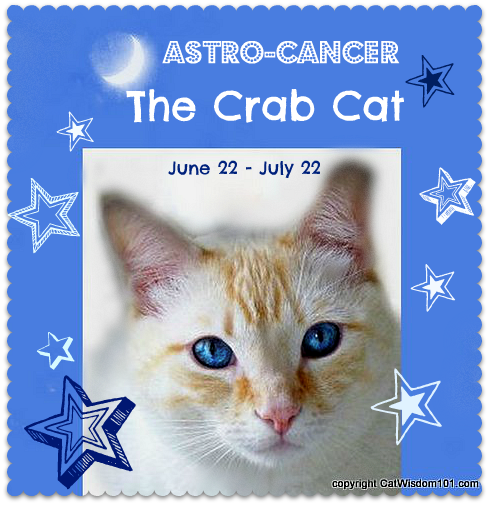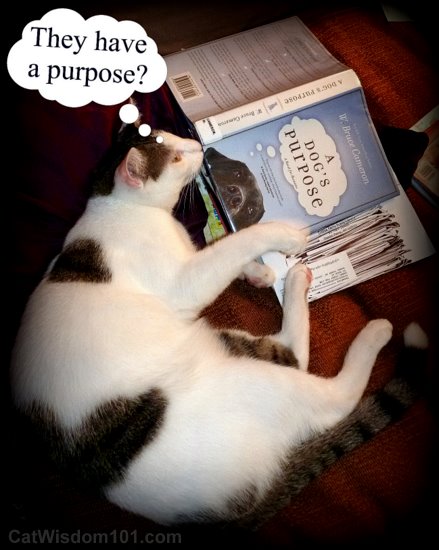
Vet 101: Cats Can Breathe Easy With Asthma
You may think: Cats, asthma? Isn’t it just for humans? It isn’t. There is feline asthma and this week’s Vet 101 with Dr. Goldstein shares what you need to know.
“Do I have bronchitis or asthma, or is it just a hairball?” That was the question I asked my physician recently when I developed a cough. He didn’t get the joke. But I know all you cat owners know what I’m talking about!
The coughing cat can present quite the dilemma to veterinarians, as there can be many causes for a cough, including asthma, bronchitis, heartworm (yup, cats can get heartworm disease just like dogs!), lungworms, hairballs, cancer, and sometimes heart disease. It’s important to get the correct diagnosis for a coughing kitty to make sure the proper treatment is instituted.
Asthma is defined as constriction of the airways in the lungs. Asthma “attacks” are often brought on by “triggers” that are inhaled. “Triggers” can include: cigarette smoke, kitty litter, dust, sprays, and seasonal pollens. (Certain types of infections and illnesses can also act as triggers). In response to the “trigger”, mucus forms in the airways. The mucus then causes the walls of the airways to become inflamed, which leads to a spasm of the airway muscles. Once those muscles spasm, the airways constrict (become very narrow), which leads to difficulty breathing, wheezing, and coughing — the “asthma attack.”
The diagnosis of asthma is based on a combination of symptoms, physical examination findings, xrays, other test results, and response to treatment.
Typical symptoms of asthma can include:
o Persisistent coughing (often in a crouched position with the neck extended)
o Wheezing
o Rapid, labored breathing (while asleep, your kitty’s chest should rise and fall less than 20 to 30 times per minute; a higher rate may indicate lung trouble)
o Open-mouth breathing (cats need to breathe through their noses, so a cat that is breathing through its mouth may be having trouble getting enough air)
o In severe cases, a change in gum and tongue color from pink (normal) to blue or grey (oxygen deprivation!) may be noted.
Once asthma has been diagnosed, various treatment methods are available.
The mainstays of asthma treatment include the use of antiinflammatories (like corticosteroids) and bronchodilators (like albuterol) to reduce the inflammation in the airways and relax the airway muscles that are in spasm, to increase oxygen flow. Medications can be administered in the form of pills, injections, and/or special inhalers. The manner in which the medications are administered depends on the frequency of signs (daily cough vs an occasional seasonal cough), severity of signs (mild vs moderate vs emergency), response to treatments (some forms of asthma can become resistant to injectable steroids), overall health (steroids must be used cautiously in some patients, like diabetics), the ability to treat your cat (if your cat hates pills, an inhaler may be a better option), and costs. It’s important to discuss all of the options with your veterinarian to determine the best course for your kitty.
If your cat has mild seasonal asthma, treating the occasional flare-up may be sufficient. If your cat has a daily cough, the use of a daily inhaler may be required. Inhalers for cats are actually a very effective, easy means of administering asthma medications, especially in a crisis situation. In severe attacks, a trip to the emergency room may be in order.
You can also help your kitty by reducing or eliminating potential triggers in the environment. Use dust-free kitty litter, eliminate plants and flowers that may release a lot of pollens, use air purifiers with HEPA filters, vacuum and dust the house frequently (no one likes to hear that part!), avoid chemical sprays in the vicinity of your cat, and (here’ a biggie…) STOP SMOKING.
For more information on feline asthma, visit www.fritzthebrave.com an for information on AeroKat inhalers. Find some fresh air, take nice, deep, cleansing breaths, and take time to smell the pollen-free flowers.
Editor’s note: There are so many perfumed chemical household products from air fresheners, aerosol cleaners to beauty products, perfumes, colognes etc. it’s no wonder 1 in 100 cats has asthma. It’s all the more reason the think “green”.






17 Comments
David
When your cat with asthma gets older they will sometimes cough quietly like they are trying to cough up some mucus. They won’t be coughing violently like they did when they were younger and you thought it was just another fur ball.
The quiet coughing usually starts at the beginning of spring when there is a lot of pollen in the air.
When this happens you should try and find a Vet that will let you first try an asthma inhaler because they might be having an asthma attack and they could suddenly die. Also, your cat probably has had asthma all of their life and you thought it was just fur ball all of this time.
My vet said my healthy 10 year old cat might have asthma after a chest and hair ball X ray proved nothing and asked me if I wanted to try an inhaler, pills or a shot. I thought the inhaler would be a lot of trouble because I would be spraying medicine directly into my cat’s mouth with a mask. So I tried the shot.
The cat was fine for a 6 months and then the quiet mucus coughing started again. I should have also chosen the inhaler because you spray the medicine directly into a large tube of air and then the cat will breathe normally from the tube without any problems. – Go to YouTube – Cat asthma inhalers. Plus look at the You Tube – Cat Asthma attacks.
Plus, if the coughing stops after using the inhaler several times you now know that your cat has asthma and you can prevent it from dying suddenly from an asthma attack in the future.
Hairless Cat
Hi Layla,
That mobile vet hospital sounds pretty cool. Would be nice to have a vet come to my house for a change.
Good asthma post. I had a cat with asthma and she did well for years on an inhaler.
=^-^= Hairless Cat Girl =^-^=
Esme
Great post we have asthma and luckily our new vet was on the ball with treatment the inhaler works wonders.
boomermuse
Esme, this is good to know. Not all vets are the same.
@Oui Oui, that’s so true!
Oui Oui
That’s a great post. The Girl has asthma, and it is bad enough when someone can tell how they feel. It must be really difficult when they can’t. We knock on wood, our kitties are healthy.
The Island Cats
Thanks for this info! We wish Dr. Goldstein could come visit us.
Abby
Great posting and much appreciated.
purrs
>^,,^<
♥Abby♥Boo♥Ping♥Jinx♥Grace♥
CATachresis
Another great informative post. Thanks. Austin does the same as Fuzzy Tales’ Nicki. I have put it down to hair in throat, but sometimes seems to happen when he is purring or I am scritching his throat. he also quite often has a runny eye .. always the same one. Apart from that, he doesn’t seem to have any discomfort.
BTW I noticed quite by chance Animal Planet are showing My cat from hell at last over here!!!
boomermuse
Yay, are they airing the news season or the last one?
CATachresis
Absolutely no idea Layla! They don’t seem to be shown on a regular basis, so have to check each day when it is on. One thing I have learnt is that Austin is NOT a cat from hell. Gives me a nice warm feeling lol
Brian
Great info! My sister Gracie has asthma and the inhales works great.
Team Tabby
thanks for posting about this. Our furcousin, Tiger, has recently been diagnosed with Asthma after lots of misdiagnosis. She is doing much better.
purrs.
Mindy
Moe
Cookie
Mike
Marg
Great post. It was good to learn all those facts. I have one cat that doesn’t exactly cough but kind of a funny sneeze. But she doesn’t do it all the time. Thanks for this.
Fuzzy Tales
Interesting post, thank you. I’ve wondered about Nicki, but don’t think this is quite it for him. He does the coughing with neck extended sometimes, can happen after grooming (hair in throat?), can be triggered from purring or being scratched on his throat, or for seemingly no reason (that I can discern). It’s not constant, he can go weeks or longer with nothing, then cough more frequently for a while, year round.
Will email with a question, actually!
boomermuse
Please, as specifically as possible.
Amber
Hello, I know this was a while back, but fuzzy tails, my kitty has the exact symptoms as yours. Did your kitty ultimately have asthma?
Pen
Hi Amber / Fuzzy Tales, my cat also has the same symptom – asthma attack only ever brought on by purring. Did either of yours ever get a diagnosis? My cat has missing sinuses (a birth defect) which breathing difficulties were initially attributed to, but that doesn’t explain the apparent asthma attacks.